- Home
- Gerald Hammond
Mad Dogs and Scotsmen (Three Oaks Book 7) Page 2
Mad Dogs and Scotsmen (Three Oaks Book 7) Read online
Page 2
‘Well, yes,’ Noel said stiffly. He pulled out a folder, started signing. Traveller’s cheques, in my experience, usually arrive with the largest denominations at the back. On that assumption and judging from the thickness of the wad, he was carrying a very large sum on him.
Daffy put her head in. ‘Car’s back at the front door with Jove inside,’ she said. ‘I’ll miss the old bugger. Mr Cochrane’s case is in the cubbyhole under the floor at the back.’
‘Thank you.’ Noel hesitated and then took out his wallet. Daffy came all the way into the room and a crisp note changed hands. Daffy raised her eyebrows. ‘Thanks a bunch,’ she said, ‘but this is in dollars.’
‘I can change it for you,’ I said. I still go to the States occasionally and I keep a small reserve of dollars handy rather than pay the bank a commission every time I change money to and fro.
‘Thanks again,’ Daffy said with more genuine warmth and withdrew into the kitchen.
Isobel produced a buff envelope. ‘Jove’s immunization certificates,’ she said. ‘His Form ID Seventy. And his pedigree. You left it with us, remember? And there’s a receipt in there.’
‘Great!’ Noel shook Isobel’s hand and turned about. In the kitchen, Beth was now busily preparing lunch while Sam, our son, stood holding on to the side of his playpen and gave a running commentary on his mother’s activities which would have been of great interest if only somebody other than Beth had been able to understand it.
Noel exchanged a polite but hasty word of farewell with Beth and then followed me through the hall and out to the front. I had my hand out to open the car door when I froze.
The spread of gravel and the drive beyond were empty.
I heard Noel draw in his breath.
Upstairs, the bathroom toilet flushed and a moment later Daffy came pattering downstairs. She had something red in her hand. ‘Hold on a moment,’ she called and came to the door.
‘Where’s the car?’ I asked her.
She moved all the way outside and looked around. Her face fell. ‘It was right here five minutes ago,’ she said. ‘Looks like some bugger’s swiped it.’ She opened her hand and showed us the rubber kangaroo. ‘Jove’ll be lost without this,’ she said disconsolately.
*
I stood there for several seconds, looking and feeling stupid. In my ordered life, cars did not simply vanish. My face must have shown some of the tumult in my mind.
‘Losing the car isn’t the end of the world,’ Daffy said, offering what comfort she could. ‘Cool down. It’s insured, isn’t it?’
I nodded. I had sent off the cheque only the previous month.
‘There you are then. That old banger didn’t owe you anything. Quite the reverse. It was on about its third trip round the clock and only held together by rust. High time we had a new one.’
She was exaggerating, of course, but there was something in what she said. I had other worries.
Beth had come to the door and heard us. ‘But what about Jove?’ she asked. ‘He’s a valuable dog.’
Noel had lost his colour. For a moment I knew what he would look like in twenty years’ time. ‘He’s a lot more than money on the hoof,’ he said shakily. ‘He’s Jove. And he’s not insured. They wouldn’t cover him in India and there didn’t seem to be any need while he was here.’
Beth was missing the point. ‘He was also in quarantine,’ I reminded her. I glanced at Noel again. As I watched, he went from white to red. I thought that he might faint. ‘We’ll get him back,’ I said.
‘My briefcase,’ Noel said in a voice that was hardly more than a whisper.
‘I’ll tell you something else,’ Daffy said to me. For a usually extrovert girl she sounded defensive. ‘Your gun’s in the car. I moved it to under the back seat because Mr Cochrane’s briefcase was just the right size for the cubbyhole under the floor at the back. You’re always telling me not to leave guns and things on view. It’s all right,’ she added quickly. ‘It was Old Faithful, not your new one.’
‘And it didn’t occur to you that I’d have to heave the crate out before I could give Mr Cochrane his case?’ I asked reproachfully.
‘That’s no longer much of a point,’ Noel said.
My mind had been trying to swim in treacle while digesting too many new thoughts all at once. His last words brought me to my senses. I turned back into the house. ‘Got to call the police,’ I said.
‘Let’s think about that,’ Noel said.
‘Nothing to think about,’ I retorted. ‘We have a stolen car which may be heading for a smash – or a bank robbery. A stolen shotgun which could also be on its way to a bank hold-up. And we have a stolen dog which was in quarantine. You know and I know that he had been thoroughly proofed against rabies, but the law doesn’t take that into account. The last two alone demand that the police be told, forthwith if not sooner, plus several other authorities. After that, we’re required to run round in small circles, wringing our hands and whimpering. The law’s quite clear on the subject.’
‘If you can joke . . .’ Beth began.
‘Gallows humour,’ I told her.
‘You’re sure we must call the cops immediately?’ Beth asked me. ‘There’s going to be an awful fuss. Run down to the gate,’ she told Daffy. ‘Just in case somebody’s made a mistake or playing a joke or something.’
‘Right.’ Daffy vanished.
We were back in the kitchen by then and Isobel had come out of the office in time to hear some of what was said and guess the rest. ‘Of course John’s right,’ she said. ‘If we don’t call the police in straight away it could make everything thirty times worse.’
I decided that an emergency call would get action started a little earlier if only by a second or two. I keyed nine-nine-nine and asked for the police. As I was connected Daffy showed up in the door and shook her head. She joined the others who were leaning against the table or the fitments, too nervous to sit down – except, that is, for Beth, who was crouched by the playpen. Sam himself had curled up for a nap on the rug. I felt a momentary pang at the picture of mother and child. Beth looks so young, although she is remarkably tough and resilient, and it came to me for the thousandth time that I was responsible for these two beings. Any threat to me threatened them.
I reported the theft of my car, very reluctantly adding the information that the car contained a shotgun and a dog in quarantine. The voice on the other end, sounding scandalized, promised that all cars would be warned of the theft and that officers would call on us soon for a statement. I raised my eyebrows at Noel but he shook his head violently. The call finished and I hung up.
‘You don’t want anything said about your briefcase?’ I asked Noel.
‘Not at this stage,’ he said. I waited, but he volunteered nothing more.
I had been standing at the wall-mounted phone in the kitchen. Isobel pushed me gently into one of the basket chairs and took the phone. ‘Rest yourself,’ she said. ‘I’ll phone Henry.’
‘Why Henry? We’ve got to notify the local authority and the Department.’
‘At least Henry still has a car, which is more than you do. We may need transport before you get your car back. If you ever do. Of course, there’s a silver lining,’ she said with an attempt at cheerfulness. ‘As far as the car’s concerned, you may be better off if it never turns up. It’s overdue for replacement and we could use the tax write-off.’
This was so close to what Daffy had said that involuntarily I glanced around, but Daffy was still absent.
Sam woke up and began to talk. Beth, readily interpreting his private language, got up to prepare his evening meal so I gathered that he was complaining of hunger.
Noel detached himself from the big table and came to stand over me. ‘Do you have to mention me by name?’ he asked. ‘Where I am and where I’m going are supposed to be deep commercial secrets at the moment. Couldn’t you just do your best to recover Jove on behalf of “a client”? No,’ he added quickly, ‘of course you couldn’t. Pay no att
ention to my idiot ramblings. You’ll have to explain what Jove was doing outside the secure area.’
‘Is there anything valuable in your case?’ I asked him.
‘Not intrinsically valuable. Just papers.’ For a moment he looked as though he was going to explain. Then he rubbed his head of curly hair and said, ‘Important is something else.’
I wanted to ask him what he meant but decided that he would be unlikely to tell me. And I would probably find out anyway. When the pot gets stirred, the first things to float to the surface are secrets. All the same, it seemed to me that Noel was even more nervous than I was and more so than even the absence of Jove could explain.
Isobel hung up the phone. ‘Henry’s coming over,’ she said.
I was pleased. I even began to relax slightly. Isobel’s elderly husband is a sure source of calm, sound advice.
*
Stemming from a so-called rationalization of police resources, the local police station was no longer permanently manned, but the Constable who still lived in the village must have been somewhere in the neighbourhood because he managed to dead-heat with Henry, who had had only a couple of miles to drive and must have left within seconds of Isobel’s phone call.
We had not had much to do with this constable since his predecessor – who had become as close to a friend as discipline allowed – had been promoted and moved to Kirkcaldy. The replacement was older than the usual run of baby-faced constables. He was evidently a man who had missed promotion and was coasting towards retirement, but in my few dealings with him I had found him patient, thorough and polite. He was tall and well-built but with the beginnings of a belly on him. His was the flat-backed head common in north-east Scotland. His hair was greying, but the day was marching on and his jaw was beginning to show blue.
Henry took a seat in one of the Windsor chairs but the Constable – Constable Buchan, I remembered suddenly – took a stand in front of the unlit Aga and handy to the wall-phone. His first act was to use the radio clipped to his tunic to report his arrival and to relay our phone number to his Control.
‘It’s better not to use the radio when it’s unnecessary,’ he told us apologetically. ‘Thieves ken fine how to listen in. And we’re getting awfu’ short of wavelengths. Now, tell me what’s adae.’ He opened his incident book on the mantelpiece.
I recounted the story, speaking as much to Henry as to Constable Buchan. I introduced Noel and referred to him as ‘a client’ but Buchan insisted on his name and wrote it down with the others, carefully checking the spelling of all our names.
When I came to the contents of the car, he looked solemn. ‘These are serious matters,’ he said. ‘The proper authorities are being informed about the dog. But, man alive, what possessed you to leave a gun in an unlocked car?’
I decided that I might as well get in a little practice at answering a question which was bound to be asked over and over again in the coming days. ‘I was about to take several dogs away in the car for steadiness training on rabbits,’ I explained, ‘so I put the gun into its hidden compartment and locked the car. Then one of the kennel-maids asked me to deal first with two younger dogs so that she could clean their run, turn their bedding and so on. So I spent a few minutes with them over in the field. Then Mr Cochrane showed up and I told the other kennel-maid to load his dog and his case. She transferred the gun to below the back seat to make room for the case in the underfloor compartment and she left the car at the door ready for me to drive away.’ A potentially useful lie occurred to me. ‘When I went out a minute or two later, I intended to take the gun out and lock it away, but the car was gone.’
The Constable decided not to read me a lecture but to leave it to those whose job it was to pontificate on firearms security. ‘Well,’ he said, ‘no doubt the lads from Firearms will be wanting a chat with you about it.’
‘No doubt,’ I said. I could see endless trouble and quite possibly a revoking of my shotgun certificate. I would get it back in the end – the courts are never as arbitrary as the police in such matters – but in the meantime our training activities would be hampered. Fortunately, Beth and Isobel had their own certificates, to facilitate compliance with the law if I should be ill or abroad.
‘What was the serial number of the missing gun?’
I would have had to go and consult my certificate or my insurance policy but Beth, who regularly amazes me by showing a foresight appropriate to someone far more mature than her very youthful appearance suggests, had already looked it up.
Daffy had returned with Hannah. I thought that they were holding hands, which surprised me because the two had never even pretended to like each other. Then I saw that Daffy was dragging the other girl by the wrist.
‘You’d better hear what Hannah saw,’ Daffy said. Evidently feeling that she had done all that was required of her, she approached the stove and seemed to lose interest.
Hannah had not needed to be dragged forward. She was eager to make her contribution. ‘I was Hoovering the grass,’ she began.
The Constable, who had blinked in amazement or disbelief at Daffy, had then looked on Hannah’s conventional, blonde prettiness with approval, but I could see that he was now beginning to have his doubts about her. ‘I beg your pardon, Miss?’ he said.
‘That’s quite right,’ I explained. ‘We’ve just got a new machine, a sort of vacuum cleaner, to lift dog-plonks and other litter off the grass.’
‘Have you now? I shall have to see this some time. Go on, Miss.’
‘I was Hoovering the lawn,’ Hannah repeated firmly. ‘The machine isn’t all that quiet, in fact it sounds a bit like a jumbo jet calling to its mate, so I didn’t hear anything. But I looked up whenever my attention was attracted by movement, seen out of the corner of my eye.’
‘You saw the car taken?’ asked the Constable quickly.
‘Not exactly,’ Hannah said. I think that we all slumped slightly in disappointment. ‘But I think that I saw the person who took it,’ she added. We all perked up again. ‘I saw somebody walk up the drive. I thought they went to the front door. Not more than half a minute later, I looked up again and the car was going down the drive and out of the gate. It drove straight on, it didn’t turn right for the village.’
‘But you did not see the man in the driving seat?’ Buchan asked.
‘No. And it wasn’t a man. It was a woman.’
‘Are you sure?’ I said. It was a stupid question, but theft of cars and guns had seemed much more likely to be a man’s crime than a woman’s. I began to revise my ideas. If the target had been the dog, the Animal Rights activists might be behind it, and the sincerest members of that lunatic fringe are predominantly female. Not that that put a more cheerful complexion on things. Animal Rights fanatics could be just as ruthless as any other criminal and, strangely, seemed to have no compunction about themselves killing or maiming animals.
Hannah smiled patiently. ‘I only saw her for a second but I’m as sure as one ever can be,’ she said. I decided not to ask her what she meant. I preferred not to know.
‘Can you describe this woman?’ the Constable asked.
Momentary glimpse or not, it was immediately evident that she could. ‘I’d put her at a little less than my height, perhaps one metre sixty-five,’ said Hannah, who was young enough to have been reared in metric. ‘She had dark auburn hair with what looked like a natural wave, worn in a pony-tail. I was left with the impression of someone who was the thin, nervous type, very intense and possibly intellectual with it. But she wasn’t as young as her hair and clothes tried to make out. I would say . . . thirty-five. She wore a grey skirt, rather on the short side, a white blouse and a sort of pinstripe waistcoat.’
‘Boring,’ Daffy said.
‘I thought she looked smart.’ (The two girls belonged very much at opposite ends of the fashion spectrum.) ‘Oh, and she was carrying one of those stubby, fold-up umbrellas with a black or dark blue cover.’
‘That’s very good, Miss,’ said Buchan.
‘Do any of you recognize the description?’ He was still writing but I was looking around the faces. Daffy’s back was to us – she was putting a plastic container of soup into the microwave oven – but she shook her head without looking round. Henry, Isobel, Hannah, Molly and Sam all looked blank.
‘No,’ said Noel. I had seen a shift of expression, instantly gone, and for the first time I thought that he might be lying. But I had known him for years. We had shot together and we had a common bond in our affection for Jove. I decided that it was not my business to betray him. Time usually produced the truth. Or buried it. Either would be all right as far as I was concerned.
Constable Buchan returned his attention to me. ‘Mobiles have been advised of the theft and of the chance of the dog running loose. The dog was wearing a collar?’
‘Of course not,’ I said wearily. ‘The dog, a particularly biddable Labrador, was in quarantine. It wouldn’t have been allowed outside its own run until just now when its owner arrived with the proper authorization to remove it in an approved containment. We wouldn’t expect the car to be stolen. Why would the dog need a collar?’
‘I think maybe the question answers itself.’ Buchan sighed for the foolishness of mortals. ‘Until the car or the dog shows up, there isn’t much that we can do.’
Daffy was not usually ‘backward in coming forward’, but she had been keeping a low profile, probably feeling vulnerable for leaving the car unlocked. Now, however, she piped up. ‘Yes, there is,’ she said suddenly. ‘The woman would have had to get here somehow. Of course, she could have been brought by somebody else. But I’ve just remembered something. I saw a Lambretta scooter parked outside the gates, pushed half into the hedge. That could be hers. I can’t think who else would have brought it. Hang on a moment and I’ll get the registration number.’
Buchan’s eyes followed Daffy’s departing rear view. ‘That’s a bright girl,’ he said wonderingly. Evidently first impressions were being revised – favourably, in the case of Daffy. ‘Your car wasn’t fitted with Tracker or suchlike?’ he asked me.

 Home to Roost
Home to Roost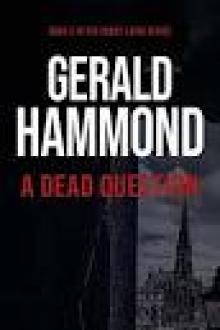 A Dead Question
A Dead Question Twice Bitten
Twice Bitten The Curse of the Cockers
The Curse of the Cockers In Loving Memory
In Loving Memory Illegal Tender (Three Oaks Book 12)
Illegal Tender (Three Oaks Book 12) Cold Relations (Honey Laird Book 1)
Cold Relations (Honey Laird Book 1)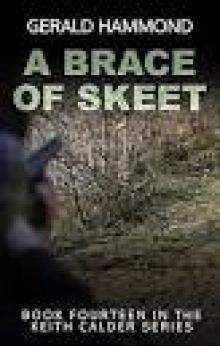 A Brace of Skeet
A Brace of Skeet Silver City Scandal
Silver City Scandal Sauce For the Pigeon
Sauce For the Pigeon Cold Relations
Cold Relations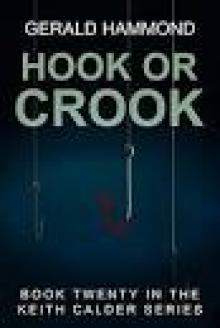 Hook or Crook
Hook or Crook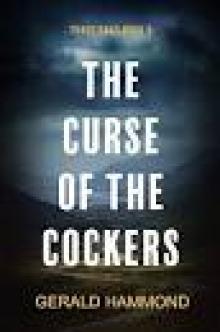 The Curse of the Cockers (Three Oaks Book 5)
The Curse of the Cockers (Three Oaks Book 5) Snatch Crop
Snatch Crop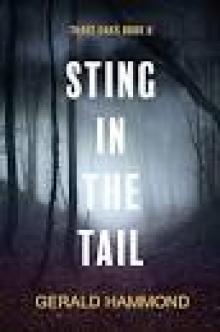 Sting in the Tail (Three Oaks Book 6)
Sting in the Tail (Three Oaks Book 6)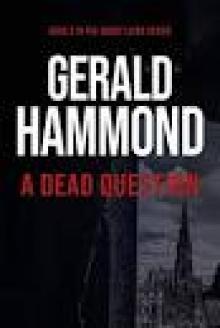 A Dead Question (Honey Laird Book 2)
A Dead Question (Honey Laird Book 2)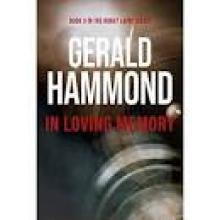 In Loving Memory (Honey Laird Book 3)
In Loving Memory (Honey Laird Book 3) Thin Air
Thin Air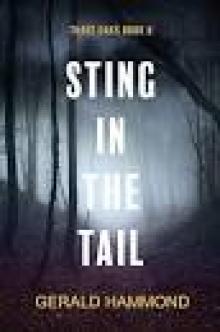 Sting in the Tail
Sting in the Tail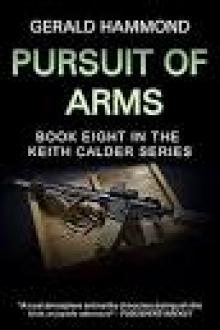 Pursuit of Arms
Pursuit of Arms The Game
The Game Give a Dog a Name (Three Oaks Book 4)
Give a Dog a Name (Three Oaks Book 4) Fair Game
Fair Game The Executor (Keith Calder Book 10)
The Executor (Keith Calder Book 10) Whose Dog Are You? (Three Oaks Book 2)
Whose Dog Are You? (Three Oaks Book 2)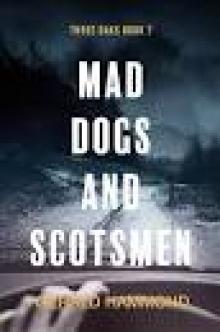 Mad Dogs and Scotsmen (Three Oaks Book 7)
Mad Dogs and Scotsmen (Three Oaks Book 7) Cousin Once Removed
Cousin Once Removed The Worried Widow
The Worried Widow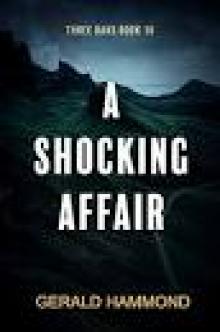 A Shocking Affair
A Shocking Affair Dead Weight (Three Oaks Book 11)
Dead Weight (Three Oaks Book 11) Whose Dog Are You
Whose Dog Are You The Revenge Game
The Revenge Game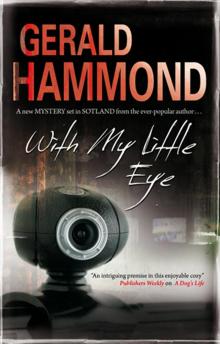 With My Little Eye
With My Little Eye Doghouse (Three Oaks Book 3)
Doghouse (Three Oaks Book 3)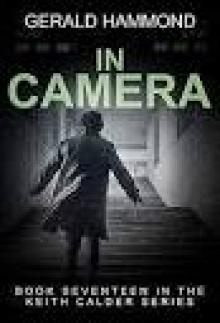 In Camera
In Camera Bloodlines (Three Oaks Book 8)
Bloodlines (Three Oaks Book 8)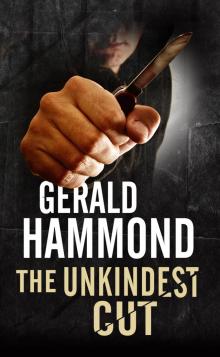 The Unkindest Cut
The Unkindest Cut